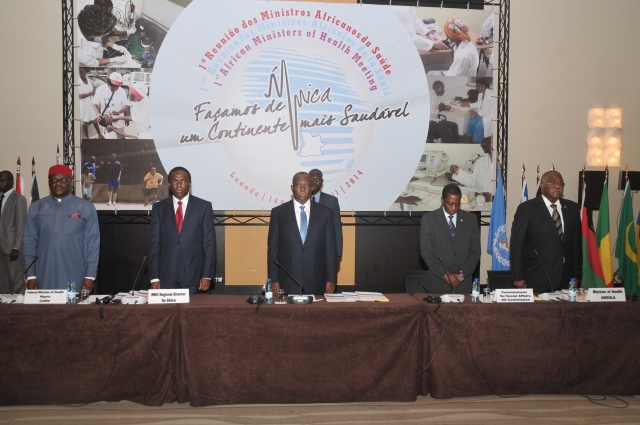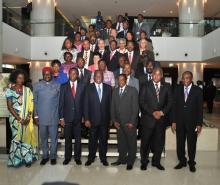Angolan Vice-President calls for stronger collaboration, innovative solutions and political commitment to tackle Africa´s health problems
 Luanda 16 April 2014 - A meeting of Ministers of Health from the African continent gets underway in Luanda, Angola with the Vice-President of Angola, H. E Manuel Vicente calling for stronger collaboration, innovative solutions and political commitment to address the continent’s health problems. Speaking at the opening session, the Vice-President highlighted the need for African countries to work towards ensuring that people have access to quality health care and urged the Ministers to provide leadership in this endeavour. “We have the technical capacity and political will to guide us towards universal health coverage in Africa,” he said.
Luanda 16 April 2014 - A meeting of Ministers of Health from the African continent gets underway in Luanda, Angola with the Vice-President of Angola, H. E Manuel Vicente calling for stronger collaboration, innovative solutions and political commitment to address the continent’s health problems. Speaking at the opening session, the Vice-President highlighted the need for African countries to work towards ensuring that people have access to quality health care and urged the Ministers to provide leadership in this endeavour. “We have the technical capacity and political will to guide us towards universal health coverage in Africa,” he said.
The Vice-President pointed out the loss of lives and collapse of health facilities as a result of civil conflicts on the continent and reminded delegates of the delays in the Angola´s progress as a result of the civil war. He highlighted the critical link between peace, health and socio economic development, and urged the participants to make efforts to achieve a permanent solution to armed conflicts in Africa.
H. E Manuel Vicente drew attention to the weak capacity of African countries, to deal with the high death and sickness associated with disease outbreaks and other public health emergencies. He expressed the Angolan Government´s willingness to host the African Centre for Disease Control and Prevention.
Addressing the delegates, the WHO Regional Director for Africa, Dr Luis Sambo observed that although Africa has made progress and continues to see a gradual reduction in the burden of communicable diseases, the health infrastructure of most countries still need strengthening in its human, material and financial capacities to enable countries achieve universal health coverage.
Referring to the importance of joint meetings between AU and WHO, the Regional Director said: “I am convinced that this new platform will generate new synergies between actors in health development in Africa. Technical cooperation among African countries should improve public understanding of common health problems and produce innovative and sustainable solutions.”
The African Union Commissioner for Social Affairs, Dr Mustapha Kalolo, underscored the critical importance of partnerships and solidarity to tackle the continent’s health problems. He said the joint AUC-WHO Health Ministers meeting is in recognition of the centrality of health to Africa´s socio-economic development. “The African Union believes that access to health is a fundamental human right and that this meeting gives an opportunity to define the way forward and to contribute to the post-2015 agenda,” he said.
Dr Kalolo used the occasion to launch the AU-Neglected Tropical Diseases (NTDs) campaign under the theme: “Now it´s time to control and eliminate NTDs in Africa” and called for urgent action to address these diseases.
In his remarks, Professor Onyebuchi Chukwu, Minister of Health of Nigeria and Chair of the 6th Conference of African Ministers of Health (CAMH6), paid tribute to the African Union Commission and the World Health Organization for organizing the meeting- He said: “This joint meeting is more efficient, saves cost and reduces the number of meetings we need to hold. The importance of partnerships cannot be over-emphasized as it will require that the position of the African Region is brought to the fore at global fora.”
The two-day ministerial meeting is the 1st Ministers of Health meeting jointly organized by the African Union Commission, the World Health Organization and the Government of Angola. Over 300 participants are attending the meeting, including, Health Minsters, Experts, observers and representatives of international and civil-society organizations and the mass media.
Delegates to the two-day meeting are expected to: identify key actions needed to accelerate progress towards Universal Health Coverage, agree on key milestones for the establishment of an African Medicines Agency, as well as on mechanisms for addressing risk factors for noncommunicable diseases.
The meeting is also expected to agree on two crucial processes: one for the establishment of an African Centre for Disease Prevention and Control, and the other for joint accountability mechanisms for implementing Declarations and Commitments agreed by the continent’s health ministers. A review of the status of Africa’s plan for ending preventable maternal and child deaths also features on the agenda of the meeting.



